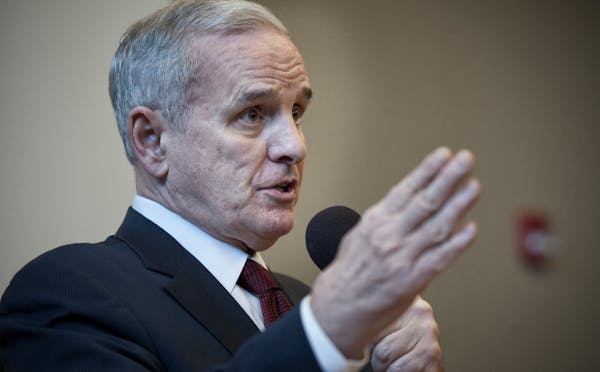The recent exchange between Gov. Mark Dayton and some community members in a discussion about increases in legislative pay ("Dayton says forum crowd in Shakopee was 'juvenile,' " May 1) illustrates a common problem.
In Minnesota and across the United States, government is continuously cited as something terrible, and members of an opposing party are fair game for insults and ridicule.
Stated plainly, we are losing — we have lost — respect for our government and public officials. Polls consistently show low approval ratings. A Gallup poll in January showed the average approval rating of Congress to be 15 percent, the lowest ever, with Republicans rating 6 percent.
Fewer than one in 10 rated the honesty and ethical standards of Congress as "very high" or "high," only slightly better than car salesmen, who were at the bottom of the list. And we all remember U.S. Rep. Joe Wilson yelling "you lie" at President Obama during an address to Congress in 2009.
So disrespect of government officials seems to be at an all-time high. Perhaps it is time to lower the level of our rhetoric and raise the level of respect for our democratic government by acknowledging that those elected to office were supported by a majority of voters.
While you may disagree with an official, we should all agree to respect their office and their role in our society. They are our leaders, and they struggle to make policy for everyone.
But perhaps our leaders can also contribute to the improvement — first by not trying to be so folksy and "just like the guy/gal next door," in part by continually referring to themselves in a casual manner and tolerating casual references from others. President Obama is widely referred to as "Barack," and our governor calls these public sessions "Meetings with Mark."
While the alliteration is cute, it tends to undermine the dignity and importance of the office. Perhaps referring to future meetings as "Dialogues with Gov. Dayton" would maintain the alliterative qualities without sacrificing the dignity.
Politicians would also do well to practice the same level of respect they desire from others — by trying to get along and ceasing to insult and badger their opposition. Returning a quality of civility to all levels of society might do much to help bring people together again, and to recognize that we have common bonds and roots as Minnesotans, as Americans and as human beings. I'm sure our religious leaders would applaud a return to kinder exchanges at all levels of adult interactions. And it would help our younger generations learn that civil interactions at all levels of life are a more effective way of communicating.
Remember "do unto others as you would have them do unto you." It's wise counsel that has lasted through the ages.
---------------------
Robert Shumer teaches and conducts research dealing with civic engagement and participatory learning at the University of Minnesota and Metropolitan State University.
Ukraine aid vote is a domestic and geopolitical inflection point



